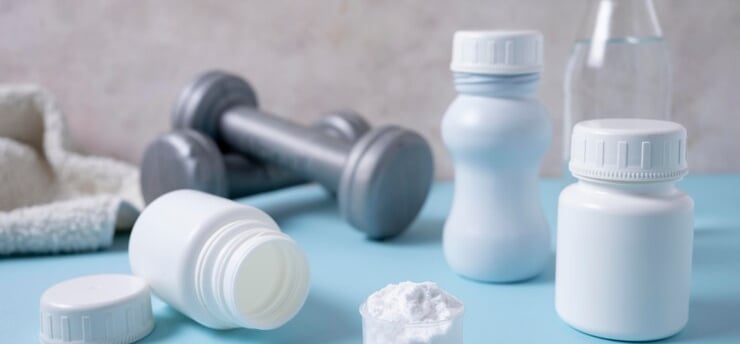Why Creatine is Important?
When it comes to fitness, most people have heard about protein powders, pre-workouts, or BCAAs. But there’s one supplement that stands tall as a scientifically proven, powerhouse addition to your routine: creatine. Whether you're aiming to build muscle, improve athletic performance, or enhance recovery, creatine often tops the list of must-haves. However, many people don’t fully understand what creatine is, how it works, or why it’s so beneficial. In this article, we’ll break down everything you need to know about creatine in simple, easy-to-follow terms. By the end, you’ll see why creatine is considered one of the most important supplements for anyone serious about fitness and overall health.
MEN'S HEALTH
11/23/20244 min read


What is Creatine, Exactly?
Creatine is a naturally occurring compound found in your muscles and brain. It’s made up of three amino acids: arginine, glycine, and methionine. Your body produces creatine on its own, and you also get it from certain foods, particularly red meat and fish. However, the amount you’d get from diet alone is relatively small compared to the needs of an active individual.
Creatine is stored in your muscles as phosphocreatine, which plays a critical role in providing energy for high-intensity, short-duration activities like lifting weights, sprinting, or even jumping. Think of creatine as a backup battery that your muscles tap into when they need a quick burst of energy.
How Does Creatine Work?
Here’s the magic of creatine:
When you perform intense physical activity, your muscles use a molecule called adenosine triphosphate (ATP) for energy. ATP is like your body’s currency for energy. However, your muscles only have enough ATP to sustain about 10 seconds of all-out effort.
That’s where creatine steps in. Creatine helps replenish ATP by donating a phosphate group to ADP (adenosine diphosphate) and turning it back into ATP. In simple terms, creatine allows your muscles to recover their energy faster, enabling you to perform better and for longer.
Why is Creatine So Important?
Let’s break down the benefits in more detail:
1. Boosts Strength and Power
If you’re lifting weights or doing explosive movements, creatine can significantly improve your performance. Numerous studies have shown that supplementing with creatine increases strength, power, and overall workout intensity. This means more reps, heavier lifts, and greater muscle growth over time.
2. Enhances Muscle Growth
Creatine helps you build muscle in two main ways. First, it increases your performance in the gym, allowing you to train harder and stimulate muscle growth. Second, creatine draws water into your muscle cells, which increases their volume. This “cell swelling” effect not only makes your muscles look fuller but also signals your body to kickstart muscle-building processes.
3. Improves Recovery
After a tough workout, your muscles need time to recover and repair. Creatine has been shown to reduce muscle cell damage and inflammation after exercise, speeding up the recovery process. This means less soreness and more frequent, effective training sessions.
4. Supports Brain Health
Creatine isn’t just for your muscles—it’s also beneficial for your brain. Studies suggest that creatine can improve cognitive function, particularly during mentally demanding tasks or when you’re sleep-deprived. It may even have potential benefits for people with neurological conditions like Alzheimer’s or Parkinson’s disease.
5. Helps With High-Intensity Sports
Creatine is a game-changer for activities that require short bursts of energy, like sprinting, jumping, or high-intensity interval training (HIIT). Athletes in sports such as soccer, basketball, and track often rely on creatine to give them that extra edge.
Common Myths About Creatine
Despite its benefits, creatine is often misunderstood. Let’s clear up some common myths:
Myth 1: Creatine is a Steroid
This one couldn’t be further from the truth. Creatine is not a steroid, nor does it work like one. It’s a natural compound that your body produces and is 100% safe when used as directed.
Myth 2: Creatine Causes Kidney Damage
Studies have consistently shown that creatine is safe for healthy individuals. Unless you have pre-existing kidney issues, creatine won’t harm your kidneys. However, it’s always a good idea to stay hydrated when using creatine.
Myth 3: You’ll Lose Your Gains When You Stop Using Creatine
While creatine does temporarily increase water retention in your muscles, the strength and muscle gains you achieve while on creatine are yours to keep. If you stop using it, you may lose the water weight, but your actual muscle tissue won’t disappear.
Types of Creatine
When shopping for creatine, you’ll notice several different types. Here’s a quick overview:
Creatine Monohydrate: The gold standard. It’s the most researched and effective form of creatine.
Micronized Creatine: A version of creatine monohydrate that’s easier to dissolve in water and gentler on the stomach.
Creatine HCl: A more concentrated form, requiring smaller doses.
Creatine Ethyl Ester: Marketed as more absorbable, but research doesn’t back this claim as strongly.
For most people, creatine monohydrate is the best option. It’s affordable, effective, and widely available.
How to Use Creatine
Dosage
The standard dosage is 3-5 grams per day. Some people choose to do a loading phase, where they take 20 grams per day (split into 4 doses) for the first 5-7 days, followed by 5 grams per day. While loading isn’t necessary, it can help you see results faster.
Timing
You can take creatine any time of the day, but many people prefer to take it after their workout with a meal. The key is consistency—take it daily to keep your muscle stores saturated.
Mix It Right
Creatine can be mixed with water, juice, or your favorite protein shake. Just make sure it’s fully dissolved before drinking.
Who Should Take Creatine?
Creatine is for everyone—not just bodybuilders or athletes. If you’re someone who:
Wants to build strength or muscle
Participates in high-intensity sports
Wants to improve recovery time
Is looking for a natural cognitive boost
Then creatine is worth considering.
Side Effects and Safety
Creatine is one of the most studied supplements in the world, with decades of research supporting its safety and effectiveness. Most people tolerate it well, but some might experience mild side effects like bloating or stomach discomfort. To minimize these, start with smaller doses and gradually work your way up.
It’s also important to drink plenty of water throughout the day, as creatine increases water retention in your muscles.
Conclusion
Creatine is one of the best investments you can make in your fitness journey. It’s affordable, easy to use, and backed by a mountain of scientific evidence. Whether you’re a beginner just starting out or a seasoned athlete, creatine can help you unlock your potential in the gym and beyond.
If you haven’t already, consider adding creatine to your routine and experience the difference it can make. Just remember: no supplement is a magic bullet. Combine creatine with a solid workout plan, balanced nutrition, and plenty of rest, and you’ll be well on your way to achieving your fitness goals.
Ready to give creatine a try? Your muscles—and your brain—will thank you!
Follow us on social media
Explore fitness articles and personal training options.
Fitness Jobs
© 2024. All rights reserved.
